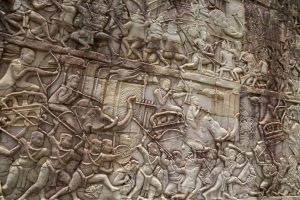Perhaps the most important words Augustine of Hippo ever heard came from the mouth a little kid playing a game. The child kept repeating in childish imitation of a teacher, “Tolle, lege! Tolle, lege!” “Take up, and read!” On impulse, Augustine took up the nearest book and began to read the words of St. Paul from Romans 13: “Not in reveling and drunkenness, not in debauchery and licentiousness, but put on the Lord Jesus Christ and make no provision for the flesh, to gratify its desires.” It was all over for him. These words of Scripture provided the internal shove necessary for him to commit his life to Christ. Even in the days before Gideon Bibles, Augustine owed his conversion to reading the Scriptures.
We who are converted, who strive daily to put on the Lord Jesus Christ and make no provision for the flesh, also need to take up and read. Why? For at least two reasons.
First, all of our Orthodox worship presupposes our familiarity with the Bible, its stories and images. When the Bishop visits, the choir takes up the song as he enters, “The prophets proclaimed you from on high, O Virgin: the Jar, the Staff, the Candlestick, the Table, the Uncut Mountain, the Golden Censer, the Tabernacle, the Gate Impassible, the Palace, the Ladder and the Throne of kings”. The hymn-writer who wrote this verse thought his hearers would recognize these images from the Old Testament. He assumed that all Christians knew of the jar which contained the manna, which was kept in the Holy Place and mentioned in Exodus 16. He assumed that all Christians knew of the uncut mountain prophesied in Daniel. He expected the hearers of the hymn to recognize these images as types and foreshadowings of the Mother of God. It is safe to say, however, that many if not most Orthodox today do not remember these stories with enough familiarity to instantly understand their significance when they hear the episcopal hymn. And that is a shame, because it means that much of our Church’s catechetical richness is lost to us. We are the poorer for it. There is a chasm fixed between our liturgical texts and our understanding of them, between the Fathers teaching and our capacity to receive that teaching. But the chasm is not unbridgeable. We can easily cross it by studying the Scriptures.
There is another even more important reason for studying the Scriptures than enhancing our appreciation of our liturgical hymnody. St. John Chrysostom once said, “Ignorance of the Scriptures is a great abyss.” By this he meant that if one does not know the Scriptures, it is easy to fall into the abyss of worldliness. If this was true in the days of St. John Chrysostom, when the secular world had a distinctly Christian tinge to it and when most of the population of Antioch and Constantinople went to church on Sunday, how much more true is it today, when most of our Canadian population does not go to church, and when our culture is correspondingly hostile to the Christian Faith. In the days of Chrysostom, if you followed the crowd, you would most likely find yourself in church. If you follow the Canadian crowd today, you will likely find yourself in more dangerous places.
St. Paul urged us to “not be conformed to the world, but to be transformed by the renewal of our mind” (Rom. 12:2). Phillips translates this as “don’t let the world squeeze you into its own mould”. As you may have noticed, the world is very good at squeezing, and it exerts its pressure on us every time we turn on the television, listen to the radio, or open a book or magazine—even (or perhaps especially) if the television, radio or book is about “spirituality”. The proper response to this squeeze is not to externally cut oneself off from the world, entering a monastery, or living in a self-constructed fantasy world of fundamentalism, or refusing any contact with the culture around us. The answer is internal. The Lord promised His disciples that if they drank any deadly thing, it would not hurt them (Mk. 16:18). Similarly, we can ingest our culture and live in our world and not be hurt if we have first swallowed the antidote to the world’s lies—namely, the truths of Scripture, as interpreted by the rest of apostolic Tradition. As the Psalmist, says, “How can a young man keep his way pure? By guarding it according to Your Word. Your Word have I hid in my heart, that I might not sin against You.” (Ps. 119:9,11) Ingesting the Scriptures can keep us safe.
This means, of course, that we approach our reading of the Scriptures for the purpose of transforming our lives, not just gaining intellectual or academic knowledge. Academic knowledge is wonderful, but that knowledge needs to not stay in our heads. It needs to sink down the further saving twelve inches, from our heads into our hearts. St. Paul said that the Scriptures were given “for teaching, for reproof, for correction, and for training in righteousness, that the man of God may be complete, equipped for every good work” (2 Tim.3:16). If we read only to gain head knowledge, we read amiss, and our reading is dangerous, for then we might suppose ourselves to be holy when we are only learned. Being learned is great, but on the Last Day, our Lord will not inquire about how learned we were. He will inquire about how holy we were, about whether or not we let the world squeeze us into its own mould. If we reply to Him that, well, yes, we did let the world squeeze us into its mould, but we wrote some great treatises on the Maccabean dating of the Book of Daniel, we will find that this reply does not impress.
Here then is why we should read take up and read: to enrich our experience of worship in this age, and to be safe in the age to come.




















